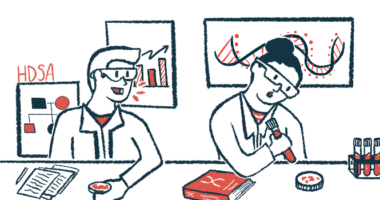Huntington’s disease progression makes math hard for my wife
Solving math problems used to come naturally to this columnist's wife

My marriage has always been a partnership. I have strengths where my wife, Jill, has weaknesses, and vice versa — until Huntington’s disease (HD) started affecting her mental state and abilities, that is.
Jill, who was diagnosed with HD in 2018, likes to say that the first time she knew she loved me unconditionally was when we went out to dinner on our first date. When the waiter came to take our order, I pulled out my wallet and gave him a coupon. Jill was surprised to see a coupon on a date, but she didn’t say anything. Dinner was wonderful, and when the bill came, I pulled out my handy tip calculator, a small piece of paper with a graph to help me figure out percentages.
Jill couldn’t see what was on the paper, so she asked what I was doing. I explained that the paper was my way of calculating tips. Jill paused, not knowing what to say about that. She was confused about why I would need a sheet of paper to figure out a tip. I explained that I’ve never been good with numbers. Words are my specialty, as I’m a writer.
Understanding this, Jill pulled out a pen and started writing on a paper napkin. She said she has tricks for everything when it comes to math, so she thought she could help me. She wrote “$125,” looked up, and said, “All you have to do to figure out 10% is move the decimal point to the left by one number. Then double that number.”
She wrote “$12.50.” Doubling that would be $25. She smiled and looked at me and said, “See, it’s simple.” I looked at the sheet, saw a bunch of numbers, and responded, “Not for me.”
She smiled and told me that I could throw the tip calculator out because she loves math and wanted the job. I smiled and knew we would be together forever.
On a recent date night, I handed Jill the bill for her to figure out the tip. She looked at it for a long time and then opened her phone and searched for her calculator. She continued to look at the bill and her phone, but she didn’t do anything.
I assumed she was distracted by her ADHD and asked what was wrong. She just sighed and handed the bill back to me. I looked at it, but it didn’t have the tip on it.
Every time I realize that one of Jill’s skills is dissipating because of HD, it makes me sad — not because I am unable to help or do what needs to be done, but because I know that Jill is seeing another little piece of her diminishing. But I know that as long as her determination isn’t taken from her, she will be OK.
Note: Huntington’s Disease News is strictly a news and information website about the disease. It does not provide medical advice, diagnosis, or treatment. This content is not intended to be a substitute for professional medical advice, diagnosis, or treatment. Always seek the advice of your physician or other qualified health provider with any questions you may have regarding a medical condition. Never disregard professional medical advice or delay in seeking it because of something you have read on this website. The opinions expressed in this column are not those of Huntington’s Disease News or its parent company, Bionews, and are intended to spark discussion about issues pertaining to Huntington’s disease.








Leave a comment
Fill in the required fields to post. Your email address will not be published.